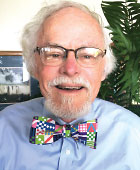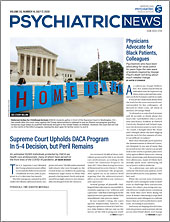After I was diagnosed with diabetes at age 4 in what was then the Belgian Congo, where my parents were missionaries, I told them, “I want to be a doctor when I grow up so I can help others.”
Thus, began a long and surprising journey to achieve that dream. We were lucky that there was a Belgian doctor nearby who diagnosed me and saved my life, but there were many bumps in the road along the way to adulthood and a career. For one, the local school I attended ended at sixth grade, so I would have had to continue my education at a boarding school. My illness made that option impossible, so my family decided to move back to America. As I reached adolescence, it seemed that everything I had read on diabetes predicted a slow and painful death before age 30. Now with insulin pumps, continuous glucose monitoring, and sophisticated lab monitoring, management is more effective, although still not easy.
As a young teen, I suffered what I think in retrospect was a major depression, and I flirted with suicide. What was the use of a prolonged education or even of living if I couldn’t achieve my dreams before I died? My parents struggled with this, and after they intercepted my first attempt, in desperation and concern, Dad said, “George, if you can’t pull yourself together, we’ll have to take you to a psychologist!” Remember, this was the early 1960s, and they had learned to make do with hard times during the Depression, and counseling wasn’t well accepted. I recovered from that episode, and though I may have had another one in college, I persevered. In college, I did participate in group therapy, which seemed to be requisite for many in the 1960s to expand emotional resilience and insight.
Both my parents were enormously supportive in encouraging me to pursue whatever career I wanted. There was one semester in high school when I thought I should be a veterinarian because medical school would be too strenuous, but I changed back to medicine shortly afterward. In college, though, I still had doubts, so I took a fifth year for further studies; then after graduation I was still anxious so I worked in a research lab for two years before plunging ahead with applications. To my chagrin, I belatedly discovered that medical schools at that time didn’t like applicants who showed ambivalence coupled with medical issues. I remember one admissions officer at a prestigious school in California saying, “Well, George, you have better credentials than most people we admit, but you’re not going to live long enough for us to get a return on our investment in your education, so we’re not admitting you.” I was devastated, but fortunately, in the coming weeks, UCLA admitted me.
Medical school was fantastic. I loved the didactic classes and devoured their content. Clinical rotations were a dream because I could begin to picture myself as a doctor. Then a setback. As we were learning the physical exam of the eye in the third year, my partner peered at my retina and said, “Something’s wrong. Let me get the attending.” When he examined me, he said, “I need to get you an appointment in my office as soon as possible.” This was my introduction to diabetic retinopathy. The doctor was able to get me enrolled in the first clinical trial of laser photocoagulation, and while it took several years and multiple treatments, the trial was ultimately successful, and my retinopathy eventually became quiescent.
Because of the new condition, I wanted to find a residency that had more regular hours and a reasonable workload. The only specialty that fit the bill that I also liked was pathology, but it turned out that I wasn’t very good at it. Then, to complicate my life further, I had a major retinal bleed that year and realized I couldn’t spend my days at a microscope. Once again, I had to adapt and consider careers that didn’t require vision, and I chose psychiatry.
The choice turned out to be the right one. My first night as resident, I was on call as the only psychiatrist in the emergency room (ER) of a large county hospital serving 2 million people. I abruptly discovered that one needs medical knowledge, psychological awareness, and empathic skills to be a psychiatrist. Fortunately, the psych nurses in the ER could lead me by the hand and tell me what to do. That experience taught me not to be judgmental of other specialties. I also learned that I loved psychiatry in part because it combines the abilities to apply medical knowledge, ponder differential skills, work with a team, and sit with an individual long enough to get to know him or her better and share your humanity together.
Ultimately, I graduated. I remember now that as I passed 30 and moved on with my career, I was relieved that I had outlived the predictions.
While I loved private practice and had a wonderful time there for over a decade, I eventually decided to move to Washington state, where I became the medical director of behavioral health for a hospital system. I am now happily retired after 43 years as a full-time psychiatrist.
I like to say now that I survived all these years because of good genes, good rearing, good medical care, and lots of hard work. And I’m very glad that I found such a rewarding profession. I learned that dreams can be fulfilled even if they’re modified from original ones, and I’ve found that a chronic illness can teach one about the human condition and lead to a better understanding of what our patients endure. ■

